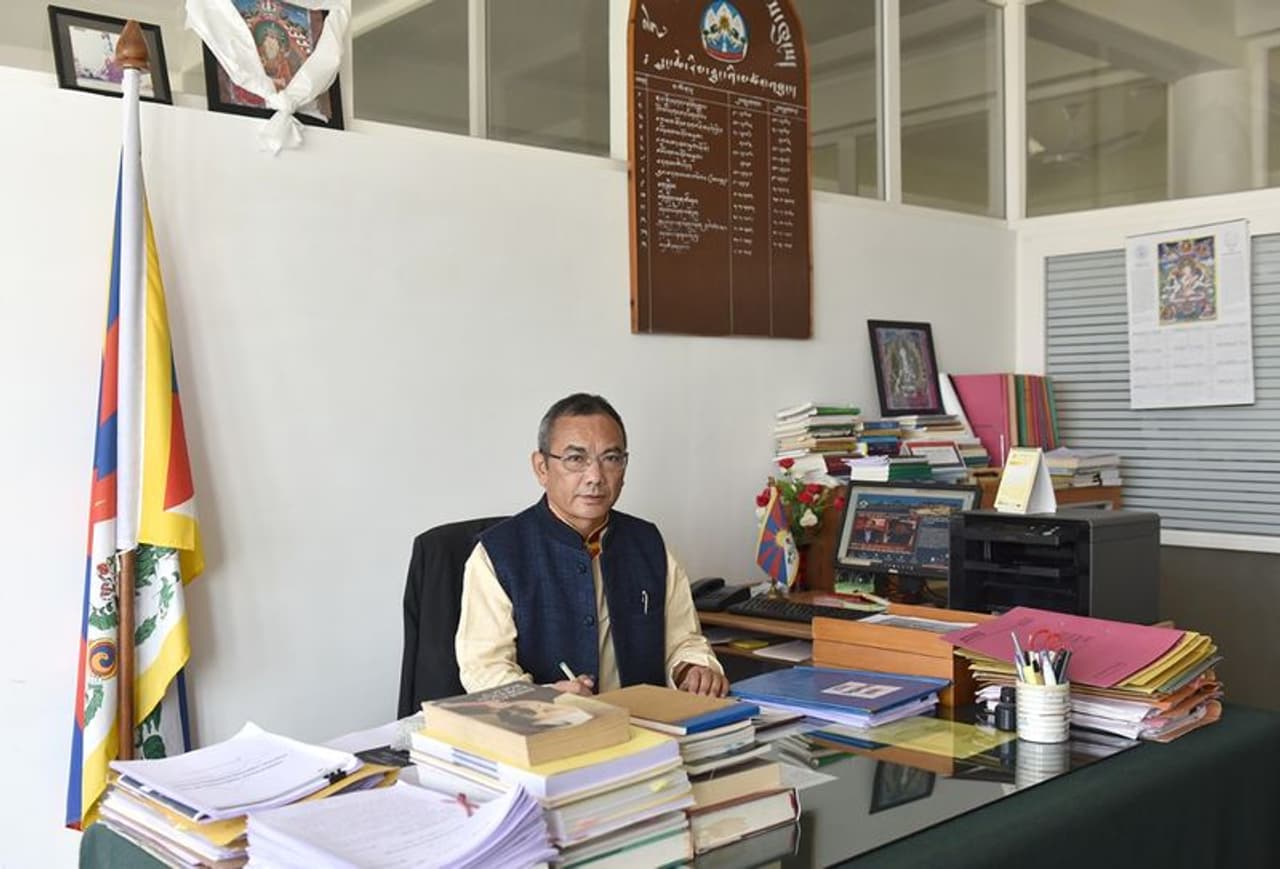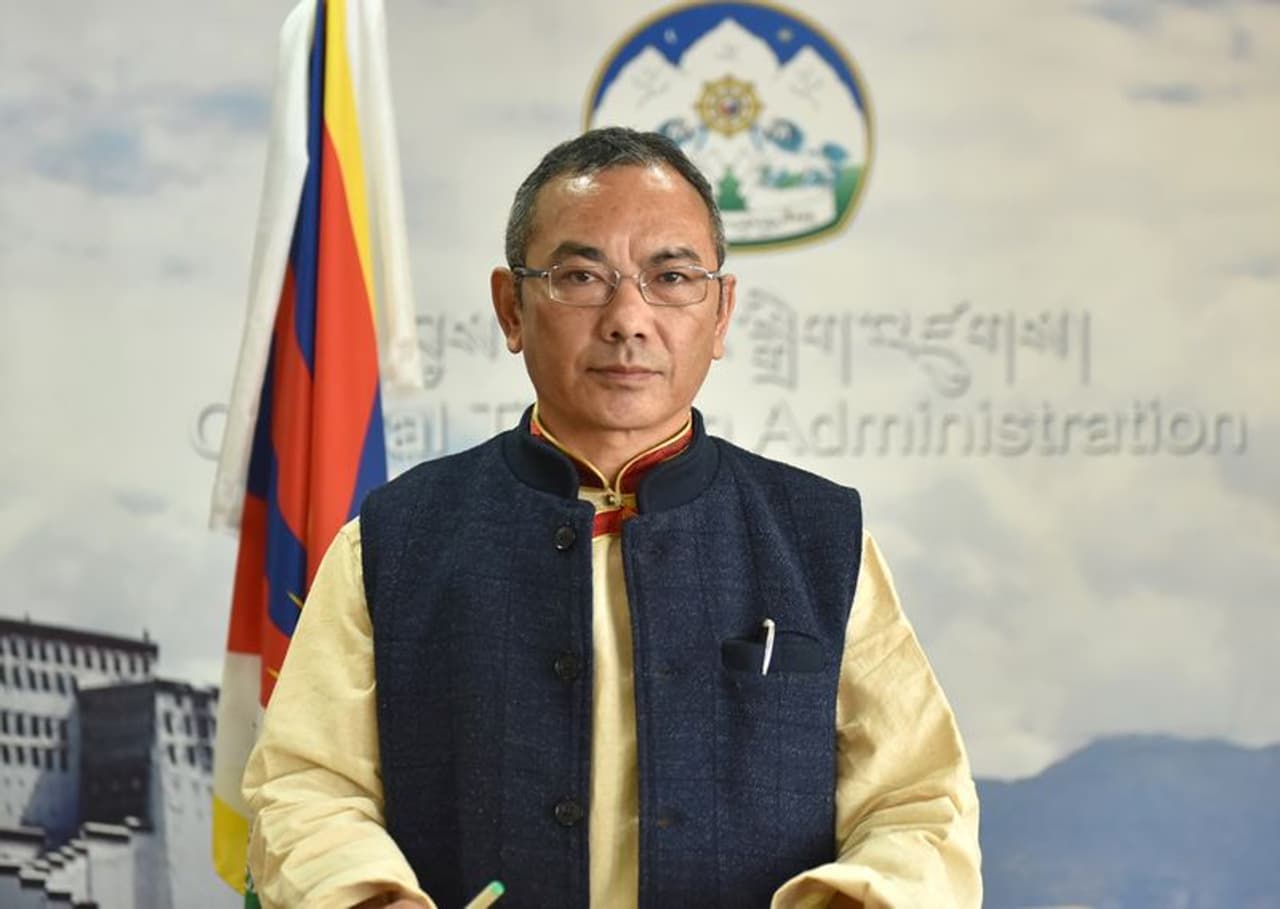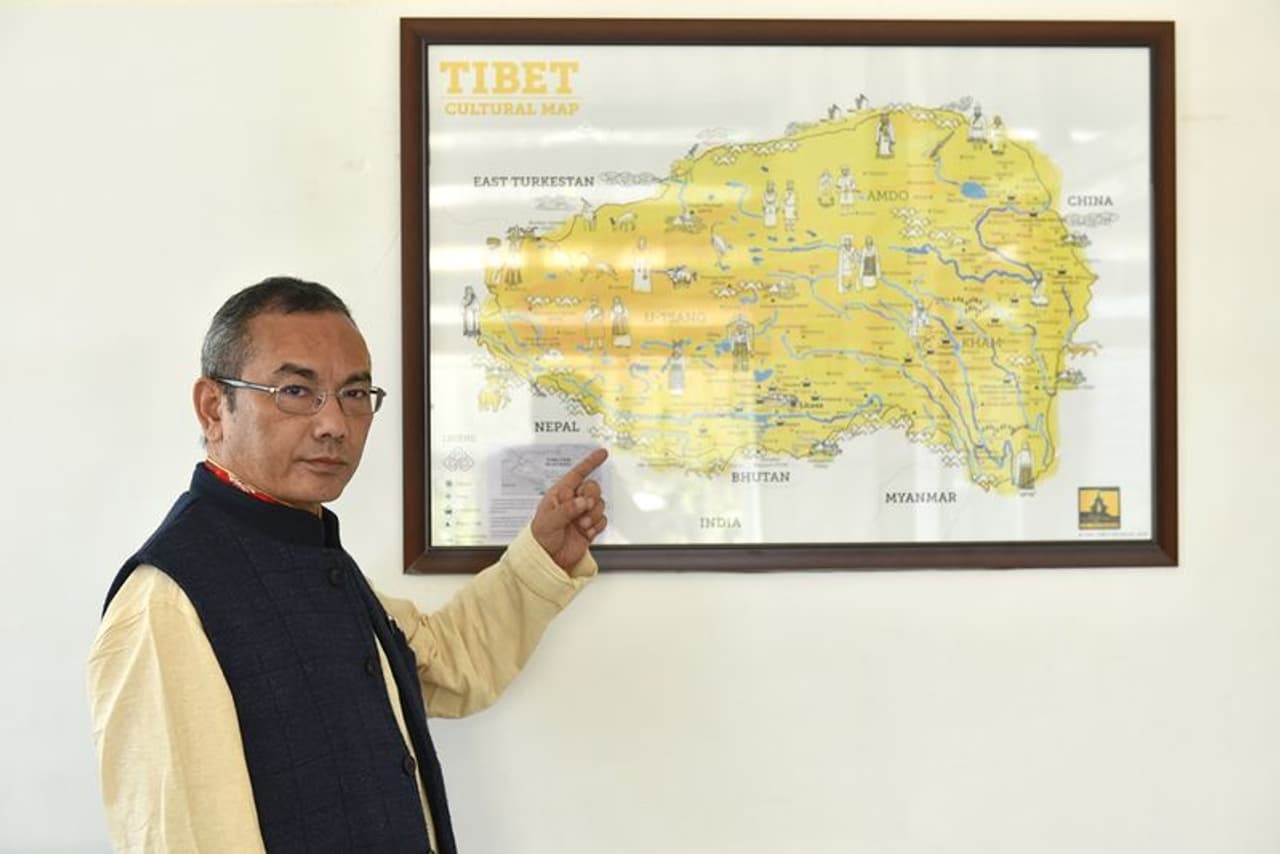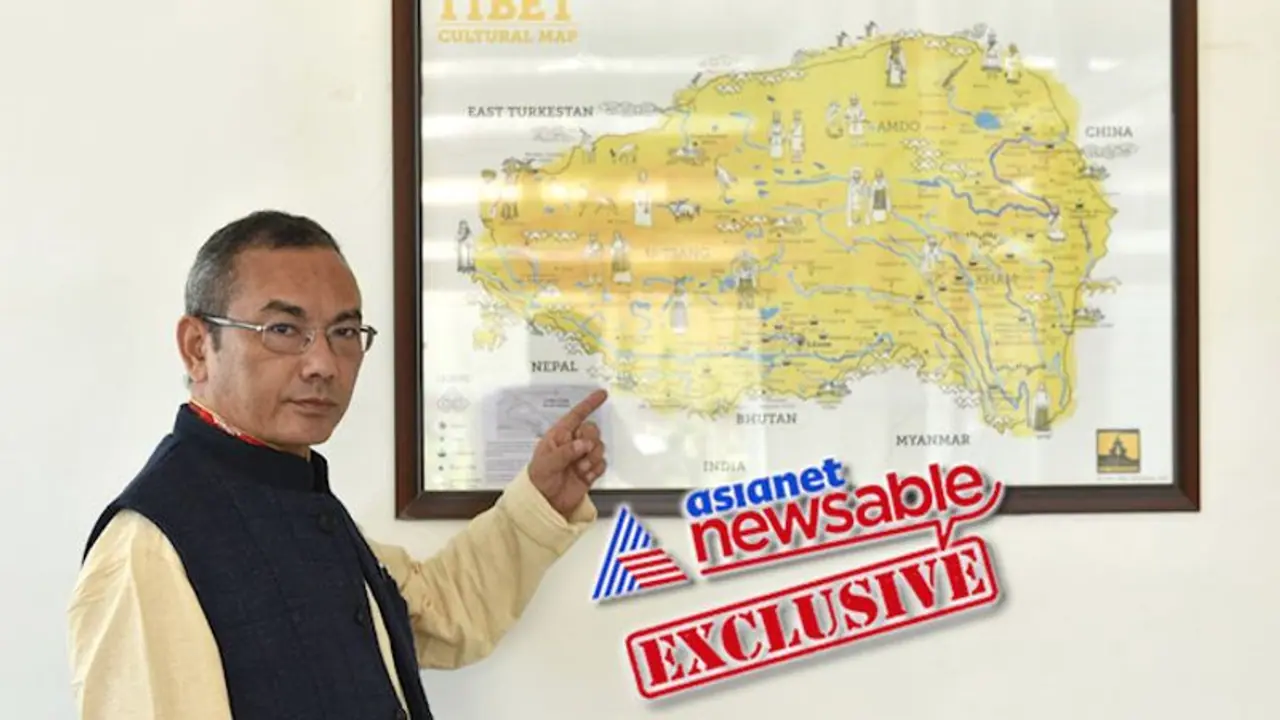Tibet is an issue of an occupied country, of human rights and religious freedom. It is unfortunate that India could not help when China invaded Tibet. It looks like China appeasement policy ruled the atmosphere then. This is how India lost its good and peaceful neighbour and how the Chinese army are now at the Indian border. These days the world is experiencing lockdown because of the Coronavirus pandemic, but Tibet has been under draconian lockdown since the 2008 Olympics. Although Tibet is physically under Chinese occupation, the faith and loyalty of the Tibetan people is with His Holiness the Dalai Lama and India. International community must work together to bring the dictatorial and tyrannical regime down and replace it with a more democratic and responsible government. - Tsewang Gyalpo Arya
‘‘As pure as dew drop,

As elated as heaven of God.
As glittery as stars above
As fragile as heart of love.
My land was free like an open sky
As vast as an ocean by.
My land was one, where no harm could befall.
As serene and gentle as a mighty river fall.
Dazzling lakes & golden sunsets,
Everywhere I turn, I could see God's assets
Shielded by mountains from every single side
As mothers embrace, cuddles her child.
Away from the clutches of battles & war
Malevolence and massacres, were miles so far
Flowers when smelled, frenzy would begin.
Breath taking sights, still lingers within.
What happened so wrong?
Why those days are gone?
Darkness has usurped the place so divine
Hatred has took its hold & nothing seems fine
Tradition and faiths, have become unknown
No sights of harmony but animosity are shown.
Mothers moaning, children sobbing...
Loss of beloved left them grieving.
Eyes are wet & lips so dry.
There heart pangs and makes them cry.
Oh! Almighty help us recover.
Give us strength, so to make evil surrender.
Let's abrogate all atrocities prevailing
Let's take a vow to start a new beginning..!’’
No…No…No! Don’t mistake it as a poem. It is actually the pining of thousands of Tibetans who were forced to flee from their motherland and take refuge in a vibrant democratic country like India. They have been dwelling here in India for decades and exude confidence that they’ll succeed one day. They are very optimistic that in their lifetime they will be able to see a free, fearless, autonomous and sovereign Tibet with basic human rights for Tibetan people. Taking pride in their ‘‘great civilization’’, they say that ‘‘one should always remain hopeful. Life without hope is often useless. China may have the largest military in the world, but they are afraid of one man – the Dalai Lama. That’s the power of truth.’’
There are some 90,000 Tibetans spread across the Indian states and Union Territories of Himachal Pradesh, Uttarakhand, Ladakh, Delhi, Sikkim, Arunachal Pradesh, West Bengal, Odisha, Chhattisgarh, Meghalaya, Maharashtra, and Karnataka. They escaped Tibet in 1959 when China invaded their country and subjected them to arrest, brutal torture and massacre.
On the eve of World Refugee Day (June 20), Tsewang Gyalpo Arya, Information Secretary at the Department of Information and International Relations of Central Tibetan Administrations (CTA), in an exclusive interview with Shri Ram Shaw, shared the story of Tibetan refugees, their past, present and the future at length.
EXCERPTS…
Please tell us briefly about Tibet's story; what happened in Tibet and how did Tibetans become refugees in India and around the world?
Tibet had been an independent country with rich cultural and religious history since ancient times. Tibet and India enjoyed a long peaceful border from Ladakh in the east to Arunachal and Sikkim in the west. In 1949, when Chinese communist party took over China, it invaded Tibet. Tibetans sought help from India and the international community. Unfortunately, no help came.
When Chinese atrocities and brutality became unbearable, Tibetan people revolted against Chinese occupation in 1959. This revolt was brutally crushed, and many Tibetans were killed. HH the Dalai Lama escaped Tibet and sought asylum in India. He was later followed by some 80,000 Tibetans. This is how Tibetans became refugees. But we still have some 7-million Tibetans in Tibet under the Communist regime.

What is the historical and political relationship between India and Tibet, and why India did not help when China invaded Tibet?
India and Tibet share deep cultural and religious ties. The long border between the two countries was among the most peaceful borders. Indian people look at Tibet as Trivistapa, the heavenly abode. Mount Kailash and lake Mansarovar which is greatly revered by Tibetans are equally venerated by Indians as the abode of Lord Shiva and his consort Parvati. Tibetans look at India as the holy land of Buddha and learning. So, for both Indians and Tibetans, their respective countries are the site of pilgrimages. This is the sacred bond between India and Tibet.
It is unfortunate that India could not help when China invaded Tibet. Although many Indian leaders strongly supported the Tibetan cause, it looks like China appeasement policy ruled the atmosphere then. This is how India lost its good and peaceful neighbour and how the Chinese army are now at the Indian border.
India gave asylum to His Holiness the Dalai Lama and Tibetan people, and a place to set up Tibetan government-in-exile in Dharamsala, please explain?
India has been very sympathetic to the Tibetan cause; Indian leaders never thought that China could be so brutal and distrustful. China violated the 17-point agreement with Tibet; they also violated the Panchsheel agreement of 1954 with India. So, when His Holiness the Dalai Lama was forced to seek asylum, India readily welcomed him and the Tibetans. The Government and people of India found it as their obligation to help the Tibetans with whom they have shared sacred cultural and religious bonds since ancient times.
We have some 40 big and small Tibetan settlement offices which look after the welfare of the Tibetans in India. With the help of India and the international community, we have made Tibet issues an international issue. Today, the issue Tibet is not in isolation, it is an issue of an occupied country; it is an issue of human rights and religious freedom. There are many Indian support groups supporting the cause of Tibet. We also have international Tibet support groups to support our issue at international forums.
What is the situation in Tibet right now? Has there been any improvement? Do you still have Tibetan refugees coming out from Tibet?
Tibetans in Tibet are facing great repression. Their religious freedom, cultural expression, language and movement are all suppressed. China sees Tibetan religion and culture as a great threat to Chinese authority. Therefore, they are doing everything to destroy this Tibetan identity.
Situation in Tibet has gone from bad to worse since Xi Jinping came to power. There is no freedom of speech and movement. China has introduced a grid-system in which community spying has been established. Everyone lives with utter fear and suspicions. Tibetans are not allowed to move freely within the district, so there is no chance that they could escape to India.
Earlier, there used to be some 2000 to 3000 Tibetans coming to India annually through Nepal, it has now come to almost nil these days. The figure started dwindling since 2008, and drastically from 2012, when Xi Jingping became the President of China. When China was awarded the 2008 Olympics, China promised the Olympic committee and the world that it would relax restrictions and improve on human rights records. But the restrictions in Tibet increased after the Olympics. These days the world is experiencing lockdown because of the Coronavirus pandemic, but Tibet has been under draconian lockdown since the Olympics.

How do the Tibetans in Tibet look at India? Are they with China or with India? Do you have any contacts in Tibet?
Tibetans have always looked at India with great hope because Tibet and India share a long history of religious and cultural relationship. India has given asylum to His Holiness the Dalai Lama and the Tibetans. Although Tibet is physically under Chinese occupation, the faith and loyalty of the Tibetan people is with His Holiness the Dalai Lama and India.
Tibetans are mostly Buddhist and they look at India as Aryabhumi, the land of Gods. A pilgrimage to Bodhgaya and Sarnath in India is like a lifetime achievement for them. China has realized this, so they have prohibited Tibetans from visiting India. In 2017, many Tibetans who were in Bodhgaya to receive Kalachakra teachings were forced to return and their passports confiscated. These days, young Tibetans are indoctrinated to condemn the Dalai Lama and India. This is what is happening in Tibet.
We don't have any contacts in Tibet. It is very dangerous for any Tibetans to have any contact with Tibetans and foreigners outside Tibet. Their mobile phones, emails and social network apps are under strict scrutiny. Chinese security officers keep a close tab on the Tibetans who have relatives and friends in India and abroad. Therefore, the only information coming out from Tibet is the Chinese propaganda.

There are many Tibetans in Nepal. We hear that Nepal has not been friendly with Tibetan refugees; please explain
There are about 10,000 Tibetans in Nepal. Historically, Nepal and Tibet enjoyed a very friendly, cultural and religious bond for many years. In fact, India, Nepal and Tibet have shared a very peaceful border since ancient times. Now, the Nepalese communist government has come under China's influence. Tibetans are having very difficult times. Those trying to escape Tibet through Nepal are arrested and sent back to Tibet. Under China's prompting, Nepal is now raising border issues with India. When Tibet was an independent country, borders along Nepal, India and Bhutan enjoyed peace and stability. After the occupation of Tibet by China, Tibetan plateau and the borders have become highly militarized and the peace has been greatly disturbed. The Nepal government should keep in mind that historically and culturally, it has a deeper relationship with India and Tibet. It should be wary of its new aggressive neighbour; otherwise, Nepal will soon face the same fate as Tibet.
Last but not the least, how do you look at this Refugee problem? How can the world solve this problem? What is the hope?
If we look at the refugee crisis around the world, refugees are mostly the victims of the dictatorial and tyrannical regimes. It is because of the fault and brutalism of the dictatorial and brutal regime that people flee, and they are uprooted from their homeland. Therefore, the root cause of the refugee problem and sufferings of the people is the wrong and harsh policies of the authoritarian and dictatorial regime.
Tibet has always been an independent and peaceful country, but the Communist dictator invaded Tibet, and brought a lot of suffering to the Tibetan people. Tibetans are still suffering. It is the same with the people of East-Turkistan (Uyghur) and Southern Mongolian people, even the Chinese people are suffering under the repressive communist regime. Not satisfied with the occupied lands, China is trying to gain full control over Taiwan, Hong Kong and it is even attacking India, Bhutan and the countries around the South China seas.
Therefore, to solve the refugee issue and to let the refugees go back to their homeland, it is very important that the international community work together to bring these dictatorial and tyrannical regimes down and replace it with a more democratic and responsible government. Now with this Coronavirus pandemic, the international community has realized the true colour of communist dictatorship. I am hopeful that China will change, and all occupied lands will be free, and Tibetans will go back to Tibet one day.
